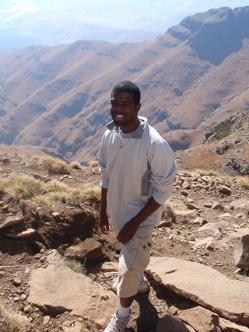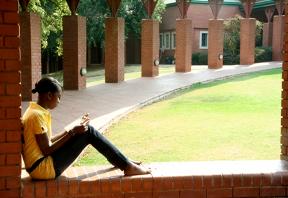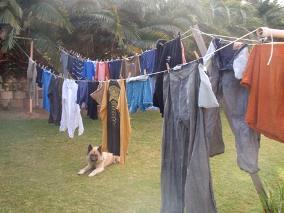

|
Fellows’ Flyer |
|
December 2008 |
|
News and views for and by Princeton in Africa Fellows |
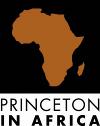
|
Free Donation With Purchase
Looking for holiday gifts? Support PiAf while you shop!
Every time you shop at any of the 700+ online stores in the iGive network, a portion of the money you spend (up to 26%!) is donated to PiAf.
It’s easy and free... Just go to www.igive.com/piaf to get started.
Participating retailers include Target, Overstock, eBay, Barnes & Noble, Lands’ End, Staples, Home Depot, and many more. |

|
In this Issue: |
|
Happy Birthday |
|
December 15 Mike Honigberg |
|
December 20 Carolina Danspeckgruber |
|
December 23 Audrey Banks |


|
My life in Uganda has offered an array of rewards and challenges. Having just passed the two-month mark, I am settling into life and amazed the time is passing so quickly. By now I am starting to find my mosquito net to be cozy. I am slowly becoming accustomed to navigating Kampala and finding my way through the smoggy, congested roads. I can overlook when people not-so-secretly touch my light hair on the bus. I appreciate how easy it is to embark on a weekend trip to visit a magnificent location— be it the Nile, a waterfall, or the rainforest. And, most days I enjoy the rock star status I achieve when I walk by the neighborhood school.
Among the most rewarding and challenging aspects of my experiences has been working at the World Food Programme. Having worked for two years at a community-based organization that promoted local food access in the US, I chose a fellowship at WFP—an organization on the other side of the spectrum, where I would surely have a new vantage point from which to consider issues of food access, agriculture, and hunger.
I work at the WFP Regional Bureau serving Southern and Eastern Africa. Our region extends from the Horn to the Cape and covers a group of countries regularly fraught with natural disasters, unrest, and poor governance. I have seen firsthand the drought-ravaged regions of Ethiopia. I have participated in debates about whether or not Congolese people who have been displaced from Internally Displaced Persons (IDP) camps can be classified as “new” IDPs. I have read daily updates about bombings, ambushes, and pirate activity in Somalia.
I very much appreciate the opportunity I have to consider the complexities and challenges of food aid and development in Africa. My vantage point—within WFP, amidst a talented, driven group of people—is affording me a rare perspective that every day colors and expands my views and beliefs. I think often about the challenges of WFP’s work. There is plenty that food aid cannot do to help people. Food aid is often a tool of donors who favor a strategically-placed country. Within the UN system, there are inefficiencies and politics. And, despite efforts to shift from aid to assistance, WFP remains largely reactionary—help is offered to vulnerable people once malnutrition rates show that their situation has become dire. WFP represents a range of contradictions, best evinced by what my supervisor told me the weekend before I began work: “Probably everything you’ve heard about the UN, good and bad, is true.”
However, more clearly than ever before, I understand that food is fundamental. When people are hungry, they are unable to ascend from poverty. They cannot agitate for better governance, undertake more sustainable agricultural practices, or send their children to school. I find it all too easy to recall the unsmiling faces of malnourished children in an Ethiopian malnutrition treatment center, a terrible example of deteriorated food access and food security. WFP reaches millions of people who are desperately in need. Is it the right way, or the best way, to combat hunger? I still have no idea. While it is easy to appreciate the challenges faced, it is far less evident how to best overcome them. And I look forward to continuing to contemplate these issues throughout my year in Uganda. |
|
Carl at Drakensburg’s Sentinal Peak, which stretches 10,000 feet above sea level. He says, “Yes, I climbed to the top!” |
|
by Carl Owens, ‘08-’09 Fellow at the African Leadership Academy in South Africa |
|
Notes from the Field |
|
Carl never thought he would get used to hanging his laundry. Fortunately, Gizmo was there to guard the first time around. |
|
A student enjoys ALA’s gorgeous campus |
|
December 29 Thomas Bohnett |
|
December 31 Stuart Campo |
|
… and Happy Holidays to All! |

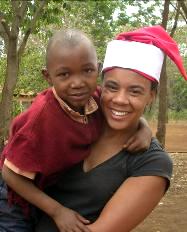

|
by Katie Fiorella, ‘08-’09 Fellow at UN World Food Program in Uganda |
|
Mzansi greetings! I’m writing from Johannesburg, where I will be working as Assistant Director of Admissions at African Leadership Academy (ALA) through next June.
ALA enrolls 97 of Africa’s most outstanding young leaders. Our students hail from 26 African countries, the U.S., Europe, and the Middle East; and they share a variety of ethnic, religious, and socioeconomic backgrounds. Each completes a rigorous, 2-year, ‘A-Level’ curriculum that is complemented by our unique curriculum in Leadership, Entrepreneurship, and African Studies. The Academy is a relatively young organization with an audacious mission—to transform Africa into a peaceful and prosperous continent by developing and supporting the next generation of African leaders.
Daily, I work to identify the next class of students who will join ALA in September 2009. Though I’m often performing an administrative role (e.g., tracking applications, sending mailers, taking inventory, scheduling interviews and meetings), my most enjoyable moments at work come from the opportunities I have to maintain current relationships and build new ones. Because we seek students from a broad range of backgrounds, every day I’m treated to a new kind of experience. Some days, this means that I get to perfect my pidgin French on the fly; other days it means that I get to hear the Liberian Minister of Education say, “Sorry Senator, I’ve got to go. Someone’s on the other line…” before I get his update on the status of our recruiting efforts in that country.
Although ALA’s constant growth necessitates a demanding work environment, I have been able to explore a bit. It’s no secret that Johannesburg has quite an infamous reputation, especially amongst foreigners. In many respects this reputation is well-deserved, but those who are able to escape the sea of security walls and soulless shopping malls will find that Joburg is also a thoroughly vibrant and cosmopolitan city. When I do find the need to get away, a short drive takes me clear out of the city where I’m surrounded with dramatic mountainscapes; and having Africa’s busiest airport nearby makes easy to get a bit farther away, too.
Fellow PiAf-ers, do give me a shout if you’re working with any young people who you think might be a good match for the Academy. But be sure to act quickly, our first deadline is approaching fast!
African Leadership Academy By the Numbers Number of applicants: 1,700 Number of nationalities represented in applicant pool: 39 Number of students offered admission: 106 Number of admitted students electing to attend ALA: 97 Number of nationalities represented in class: 29 2008 ALA acceptance rate: 6.2% 2008 Harvard University acceptance rate: 7.1% |
|
Notes from the Field |
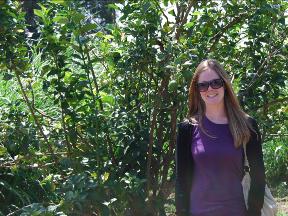
|
Katie with a fruit tree in a test orchard (the orange tree will be grafted so that local farmers can start asset-building orchards) |
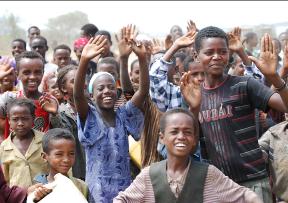
|
Beneficiaries of a school feeding program in Ethiopia |

|
Katie’s rafting trip down the Nile (PiAfer Mike Scharff was in the boat, too!) |
